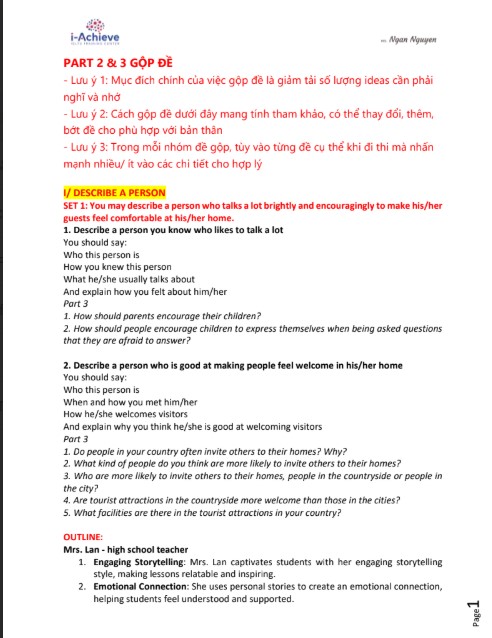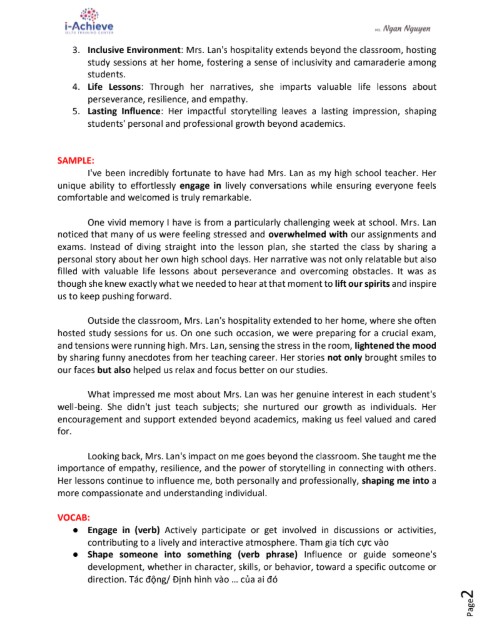


PART 2 & 3 GÓP ĐỀ
Lưu ý 1: Mục đích chính của việc góp đề là giảm tải số lượng ideas cần phải nghĩ và nhớ
Lưu ý 2: Cách góp đề dưới đây mang tính tham khảo, có thể thay đổi, thêm, bớt để cho phù hợp với bản thân
Lưu ý 3: Trong mỗi nhóm đề, tùy vào từng cụ thể thì thi nhấn mạnh nhiều/ ít vào các chi tiết cho hợp lý
I/ DESCRIBE A PERSON
SET 1: You may describe a person who talks a lot brightly and encouragingly to make his/her guests feel comfortable at his/her home.
- Describe a person you know who likes to talk a lot
You should say:
Who this person is
How you knew this person
What he/she usually talks about
And explain how you felt about him/herPart 3- How should parents encourage their children?
- How should people encourage children to express themselves when being asked questions that they are afraid to answer?
- Describe a person who is good at making people feel welcome in his/her home
You should say:
Who this person is
When and how you met him/her
How he/she welcomes visitors
And explain why you think he/she is good at welcoming visitorsPart 3- Do people in your country often invite others to their homes? Why?
- What kind of people do you think are more likely to invite others to their homes?
- Who are more likely to invite others to their homes, people in the countryside or people in the city?
- Are tourist attractions in the countryside more welcome than those in the cities?
- What facilities are there in the tourist attractions in your country?
OUTLINE:
Mrs. Lan – high school teacher
- Engaging Storytelling: Mrs. Lan captivates students with her engaging storytelling style, making lessons relatable and inspiring.
- Emotional Connection: She uses personal stories to create an emotional connection, helping students feel understood and supported.
- Inclusive Environment: Mrs. Lan’s hospitality extends beyond the classroom, hosting study sessions at her home, fostering a sense of inclusivity and camaraderie among students.
- Life Lessons: Through her narratives, she imparts valuable life lessons about perseverance, resilience, and empathy.
- Lasting Influence: Her impactful storytelling leaves a lasting impression, shaping students’ personal and professional growth beyond academics.
SAMPLE:
I’ve been incredibly fortunate to have had Mrs. Lan as my high school teacher. Her unique ability to effortlessly engage in lively conversations while ensuring everyone feels comfortable and welcomed is truly remarkable.
One vivid memory I have is from a particularly challenging week at school. Mrs. Lan noticed that many of us were feeling stressed and overwhelmed with our assignments and exams. Instead of diving straight into the lesson plan, she started the class by sharing a personal story about her own high school days. Her narrative was not only relatable but also filled with valuable life lessons about perseverance and overcoming obstacles. It was as though she knew exactly what we needed to hear at that moment to lift our spirits and inspire us to keep pushing forward.
Outside the classroom, Mrs. Lan’s hospitality extended to her home, where she often hosted study sessions for us. On one such occasion, we were preparing for a crucial exam, and tensions were running high. Mrs. Lan, sensing the stress in the room, lightened the mood by sharing funny anecdotes from her teaching career. Her stories not only brought smiles to our faces but also helped us relax and focus better on our studies.
What impressed me most about Mrs. Lan was her genuine interest in each student’s well-being. She didn’t just teach subjects; she nurtured our growth as individuals. Her encouragement and support extended beyond academics, making us feel valued and cared for.
Looking back, Mrs. Lan’s impact on me goes beyond the classroom. She taught me the importance of empathy, resilience, and the power of storytelling in connecting with others. Her lessons continue to influence me, both me personally and professionally, shaping me into a more compassionate and understanding individual.
VOCAB:
- Engage in (verb) Actively participate or get involved in discussions or activities, contributing to a lively and interactive atmosphere. Tham gia tích cực vào cuộc sống/sự việc.
- Shape someone into something (verb phrase) Influence or guide someone’s development, whether in character, skills, or behavior, toward a specific outcome or direction. Tác động/ Định hình vào …của ai đó
- Lighten the mood (collocation) Bring humor, positivity, or relaxation into a situation, reducing tension and creating a more comfortable environment. Giúp tình thân phần khói, vui vẻ
- Not only… but also… (structure) Emphasize two important points or aspects, highlighting their significance and contribution to a broader understanding. Không những…. mà còn….
- Lift someone’s spirits (collocation) Improve someone’s mood, motivation, or morale through encouragement, support, or positive interactions. Cải thiện tinh thần
- To be overwhelmed with (adj) Feel deeply affected or burdened by emotions, responsibilities, or challenges, making it difficult to cope or manage effectively. Bị choáng ngợp bởi….
SET 2: You may describe a foreigner whom you don’t know but you by chance watched a video of him speaking Vietnamese very well on Facebook & you want to know more about him
- Describe a foreigner you know who speaks your language well
You should say
Who this person is
Where he/she is from
How he/she learns Vietnamese
And explain why he/she can speak Vietnamese wellPart 3- What foreign languages do Vietnamese children learn English?
- Why do Vietnamese children learn English?
- Why are so many people learning English?
- How can you help children learn English?
- Do you think the way people learn English today is the same as in the past?
- What are the benefits of the Internet for people’s learning?
- Describe someone you don’t know but would like to know more about
You should say
Who this person is
How you knew him/her
What interesting things he/she has done
And explain why you want to know more about him/herPart 3- Are there any differences in the relationship between you and other people?
- Do people feel lonely in crowded cities?
- Where and how can people get to know new people?
- Can clothing tell a person’s personality?
- Why do individuals from the same family have different personalities?
- How does society influence a person’s personality?
SAMPLE:



